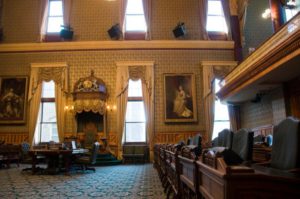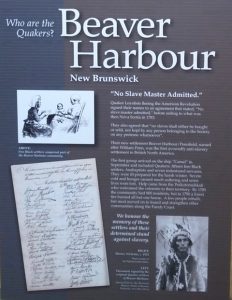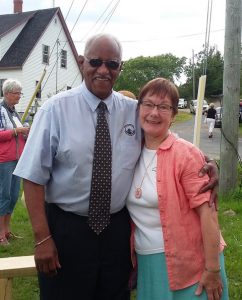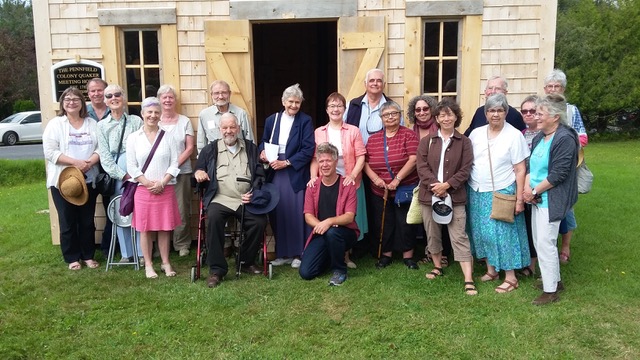The following document was prepared by a working group of New Brunswick Monthly Meeting of the Religious Society of Friends (Quakers) to assist in our understanding of Indigenous communities’ right of access to the lobster fishery in Maritime Canada. It has been approved by the Monthly Meeting for distribution.
In 2007, Canada convened a Truth and Reconciliation Commission (TRC) to examine the horrific actions and legacy of the Indian Residential School System. In 2015 the TRC released its final report and Calls to Action.
Friends are engaging in the work of upholding Indigenous Peoples’ human rights by actively pursuing the decolonization of Canadian society. This includes building partnerships and practices of reconciliation under the guidance of and through respectful relationship with Indigenous people(s) in our local communities and across this land.
Our work is deepened and given direction by the United Nations Declaration on the Rights of Indigenous Peoples, and the Truth and Reconciliation Commission’s Calls to Action and Principles of Reconciliation.
As we are reminded by the TRC, “Reconciliation is not an Aboriginal problem; it is a Canadian one. Virtually all aspects of Canadian society may need to be reconsidered. … Reconciliation will take some time.” (Honouring the Truth, Reconciling for the Future, TRC, 2015)
The focus is now on the fisheries in the Maritime Provinces.
We acknowledge that this situation is very complex and that there are many layers. The following is offered as background:
- Unlike some other Treaties with First Nations in other regions of Canada, the Peace and Friendship Treaties of the Wabanaki in the Maritimes with the Crown never ceded land or resources.
- In 2016, Canada committed to implement the United Nations Declaration on the Rights of Indigenous Peoples which affirms Indigenous peoples’ right to self-determination, including the right to participate in decisions affecting their rights, free, prior and informed consent for legislative or administrative measures that may affect them, and to determine and develop priorities and strategies for exercising the right to development and how their lands, territories and resources may be used.
- There has long been a right for Indigenous People to hunt and fish for Food, Social and Ceremonial (FSC) reasons, which can occur any time – even when the season is closed to the commercial sector, during which the sale of lobster is prohibited.
- Twenty-one years ago, the Supreme Court of Canada decided the R v. Marshall case. In that case, the court affirmed that the 1760 and 1761 Peace and Friendship Treaties with the British and Section 35 of the 1982 Constitution Act gave Indigenous people the right to hunt, fish and gather in pursuit of a “moderate livelihood” from the resources of the land and waters. In Marshall II, the clarification stated that conservation-based regulations would still apply. No clear rules for implementation of the Marshall decision have been issued.
- All fishing is governed by the Department of Fisheries and Oceans Canada (DFO). There are now multiple kinds of licenses granted to fish for lobster in the Maritimes:
- a) The first, which governs most inshore fishing, is a commercial, owner-operator license. These in-shore fisher people fish in season; a certain number of licenses per zone are issued; and then a certain number of traps per license are granted/allowed. The licenses are linked to particular boats.
- b) DFO created communal fishing licenses for Aboriginal organizations. According to the language of the regulations, this includes an Indian band, an Indian band council, a tribal council or an organization that represents a territorially based Aboriginal community. The legislation that creates these licenses allows the Minister of Fisheries and Oceans to issue licenses to the band, then either the Minister or the band designates who will fish, the size of the traps, the vessels that may be used, the maximum number of designated persons who may fish at one time, and the disposition of the fish under the authority of the license. This leaves tremendous discretion to the DFO or the designated council, and variability on the conditions between Indigenous communities, and within fishing areas. These licenses are fished within the regular DFO-regulated season, and are often leased to corporations.
- c) There are also offshore licenses for lobster fishing. According to the Halifax Examiner, Clearwater Fine Foods once held all of the offshore licenses for Lobster Fishing Area (LFA) 41. These licenses have no limits on seasons or traps. The total allowable haul is 720 tonnes, but Clearwater is allowed to exceed that limit to make up for years that it did not meet the limit. Recently, Membertou First Nation paid Clearwater $25 million for two of Clearwater’s eight offshore lobster licenses. On November 9, 2020, a coalition of Mi’kmaq First Nations in Nova Scotia and Newfoundland and Premium Brands in BC announced the purchase of Clearwater in a billion-dollar deal. This will become Atlantic Canada’s largest wild seafood corporation.
- Part of the original intent of the structure of licenses in the Maritimes was to support and maintain a small fishery. This would stand in direct opposition to the corporate and global model of vertical integration which has decimated communities of fishers around the world. Both the structure of the LFA 41 agreement with Clearwater (now owned by a First Nations coalition and Premium Brands) and the communal licenses, have allowed for greater shares of the fishing activity to become encroached upon by corporate interests. This leaves individuals within the Indigenous communities unable to become integral members of the fishing community.
Twenty-one years after the Marshall decision, on September 17, 2020, and on the anniversary of that decision, the Sipekne’katik First Nation distributed licenses and tags and launched its own self-regulated “moderate livelihood” lobster fishery off a wharf in St. Mary’s Bay, Nova Scotia (part of LFA 34). Several other First Nations groups launched their own “moderate livelihood” fisheries in other parts of Nova Scotia on October 1, Treaty Day. These are based around the “Principles of a Netukulimk Livelihood Fishery.” The Basic Principle of Netukulimk is “the use of the natural bounty provided by the Creator for the self-support and well-being of the individual and the community by achieving adequate standards of community nutrition and economic and spiritual well-being without jeopardizing the integrity, diversity or productivity of the natural bounty.” Principle 16 of the Principles of a Netukulimk livelihood fishery states “Food, Social & Ceremonial, Commercial, Communal-Commercial and Netukulimk livelihood fishery are distinct and separate, with their own rules and regulations” (this information taken from a chart published within the Halifax Examiner series, “Lobster Fishery At A Crossroad”).
There were many media reports of attacks and mob violence by non-indigenous people on First Nations people after the launch of a “moderate livelihood” fishery by the Sipekne’katik. These included reports of a truck burning, damage to lobster traps, a lobster storage facility destroyed by fire, and people being threatened. Arrests have been made and a court injunction to stop the violence was brought down.
Because of over-fishing in the Bay of Fundy, species that were historically abundant (i.e., cod, pollock and herring) are in severe decline, thus limiting opportunities for diversified fishing livelihoods. In the past, several species contributed seasonally to household incomes, whereas today the majority of fishing income comes from lobster alone. This has increased tensions over the continued availability of the resource and the need for serious conservation.
For the Indigenous and non-Indigenous communities to share access to the lobster fishery in a just and peaceful way, a common understanding about management and conservation must be reached. The current confusion around policies and regulations must be resolved through consultation and negotiation.
TRC Principle #6 states: “All Canadians, as Treaty peoples, share responsibility for establishing and maintaining mutually respectful relationships.” TRC Principle #9 states: “Reconciliation requires political will, joint leadership, trust building, accountability, and transparency, as well as a substantial investment of resources.” These are Príncipes around which all parties can unite toward a resolution to the current lobster fishing conflict.
Honouring these principles, we call upon DFO to convene conversations with all stakeholders to discuss the future and sustainability of the lobster fishery across the Maritimes. In addition, we urge the DFO to include Indigenous communities in decisions on regulations and methods of compliance.
We note that the Federal Government has appointed a “special representative” to meet with both Indigenous and non-Indigenous communities in an effort to “de-escalate tensions” and “find some common ground, some shared perspective on the way forward,” and that he will prepare recommendations for the Minister of Fisheries and the Minister of Crown-Indigenous Relations.
The law is quite clear. First Nations people have the right to a “moderate livelihood” from access to the resources of the land and sea.
(For more on the rights of Indigenous people, see the statement on the Canadian Friends Service Committee (CFSC) website by the members of the Coalition for the Human Rights of Indigenous Peoples: https://quakerservice.ca/news/honour-mikmaw-fishing-rights/)
We call on the federal government and the governments of the Maritime provinces to do more to educate the general public on the unique Peace and Friendship Treaties, the Marshall decision, and the rights of Mi’kmaq, Maliseet and Passamaquoddy peoples.
Finally, we believe all who fish the waters and care for the fisheries of the Maritimes can reach a common understanding of what will be required to not overfish the lobster and to maintain the bounty of the fishing grounds for the mutual well-being of all parties.
We call on all people of faith to hold all parties involved in prayer. We pray that respect will prevail. We can know each other and truly see each other through respect and friendship.
New Brunswick Monthly Meeting of the Religious Society of Friends (Quakers)
Vince Zelazny, Clerk
20 November 2020

 On Tuesday, July 21, New Brunswick Monthly Meeting wrote a letter to Premier Higgs requesting the Premier to respond positively to the proposal of the Wolastoqey Chiefs for an inquiry into systemic racism. That letter was published online by Brunswick News on Friday and in the print editions of the Fredericton Daily Gleaner, and the Moncton Times-Transcript on Saturday.
On Tuesday, July 21, New Brunswick Monthly Meeting wrote a letter to Premier Higgs requesting the Premier to respond positively to the proposal of the Wolastoqey Chiefs for an inquiry into systemic racism. That letter was published online by Brunswick News on Friday and in the print editions of the Fredericton Daily Gleaner, and the Moncton Times-Transcript on Saturday. The past weekend at Beaver Harbour was indeed an extraordinary one. The event on Saturday, September 10, 2016 honouring the Loyalist Quakers who arrived in 1783, fleeing the aftermath of the American revolution was most informative and memorable. Deborah Coleman, who is president of the NB Branch of the United Loyalists Empire, gave the lead presentation, honouring the Quakers who established the town of Beaver Harbour and stated in the signing of the manifest that “no slave masters be admitted”. The Quakers faced rather extreme conditions the first winter, lost many of their cattle, but were grateful for the assistance of the Passmaquoddy who came to their aid. After building houses in a community that consisted of over 300 persons, the whole town was lost to fire just 9 years later. What a disappointment that must have been after so much work and care to build a meeting house and provide food and shelter for themselves. A lovely green area close to the Beaver Harbour Museum has two stones commemorating the founding Quakers. Ms Coleman would like for Quakers to support an application to designate the park as a national heritage site. Deborah is a direct descendant of one of those original Quakers, Benjamin Brown.
The past weekend at Beaver Harbour was indeed an extraordinary one. The event on Saturday, September 10, 2016 honouring the Loyalist Quakers who arrived in 1783, fleeing the aftermath of the American revolution was most informative and memorable. Deborah Coleman, who is president of the NB Branch of the United Loyalists Empire, gave the lead presentation, honouring the Quakers who established the town of Beaver Harbour and stated in the signing of the manifest that “no slave masters be admitted”. The Quakers faced rather extreme conditions the first winter, lost many of their cattle, but were grateful for the assistance of the Passmaquoddy who came to their aid. After building houses in a community that consisted of over 300 persons, the whole town was lost to fire just 9 years later. What a disappointment that must have been after so much work and care to build a meeting house and provide food and shelter for themselves. A lovely green area close to the Beaver Harbour Museum has two stones commemorating the founding Quakers. Ms Coleman would like for Quakers to support an application to designate the park as a national heritage site. Deborah is a direct descendant of one of those original Quakers, Benjamin Brown. Jimmy Hawkins, founder of the Beaver Harbour Archives and Museum, along with his wife, Florence, was a part of the planning for this event. He gave us all a warm welcome and it was obvious to see how much work had been done to preserve the records his Mother had started to collect in the early part of the 20th century. He was also very keen to have the panels “Who Are the Quakers” made up for adding to the museum collection. He kept saying how pleased his Mother would have been to see what all had been done. His Mother was responsible for the erection of the first stone commemorating the Quaker Burial Ground. Carmen Eldridge donated the second stone which contained the “no slave masters admitted’ on the text.
Jimmy Hawkins, founder of the Beaver Harbour Archives and Museum, along with his wife, Florence, was a part of the planning for this event. He gave us all a warm welcome and it was obvious to see how much work had been done to preserve the records his Mother had started to collect in the early part of the 20th century. He was also very keen to have the panels “Who Are the Quakers” made up for adding to the museum collection. He kept saying how pleased his Mother would have been to see what all had been done. His Mother was responsible for the erection of the first stone commemorating the Quaker Burial Ground. Carmen Eldridge donated the second stone which contained the “no slave masters admitted’ on the text.